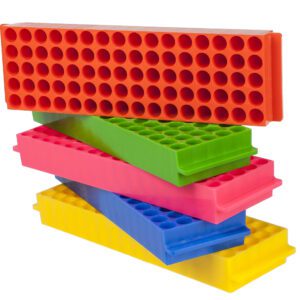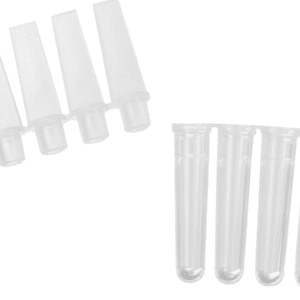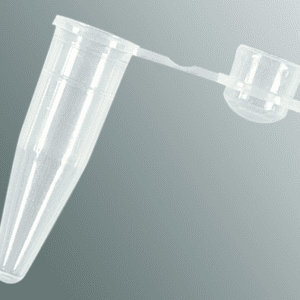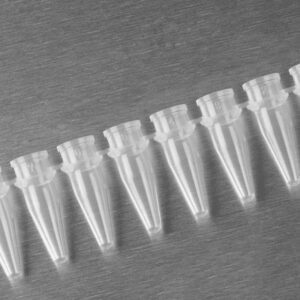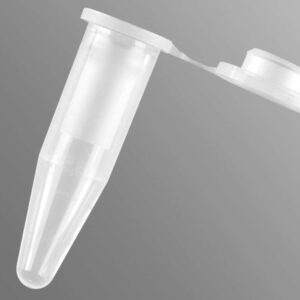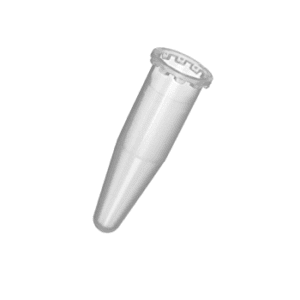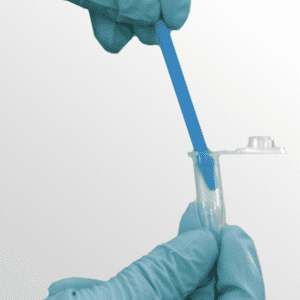Sold
out
out
Axygen Microtube Racks 5 Each in 5 lue Fluorescent Colors, 25/CS Corning
د.إ 974.10
Out of stock
Designed to accommodate 1.5 or 2.0ml microtubes or screw-cap microtubes. The Polypropylene racks resist most chemical and organic solvents and are perfect for storing tubes…
-50%
Axygen® 0.1 mL Polypropylene PCR Tube Strips and Caps, 4 Tubes/Strip, 4 Caps/Strip, Clear, Nonsterile
Original price was: د.إ 6,534.10.د.إ 3,241.00Current price is: د.إ 3,241.00.
In stock, 6 units
Axygen® 0.1 mL Polypropylene PCR Tube Strips and Caps are small laboratory tubes that are commonly used for polymerase chain reaction (PCR), a technique used…
Axygen® 0.2 mL Maxymum Recovery® Thin Wall PCR Tubes with Domed Cap, Clear, Nonsterile
د.إ 1,918.10
In stock, 1 unit
Axygen® 0.2 mL polypropylene thin wall PCR tubes with domed caps are designed to fit standard 96 well blocks and are available in an assortment…
Axygen® 0.2 mL Polypropylene PCR Tube Strips, 8 Tubes/Strip, Clear, Nonsterile
د.إ 2,178.10
In stock, 8 units
Axygen® 0.2 mL thin-wall 8 strip PCR tubes, available in an assortment of colors are designed to fit a wide variety of thermal cyclers. Ultra-thin…
Axygen® 0.2 mL Thin Wall PCR Tubes with Domed Cap, Clear, Nonsterile
د.إ 2,140.10
In stock, 4 units
Axygen® 0.2 mL polypropylene thin wall PCR tubes with domed caps are designed to fit standard 96 well blocks and are available in an assortment…
Axygen® 0.2 mL Thin Wall PCR Tubes with Flat Cap, Clear, Nonsterile,1000 / Pk
د.إ 197.10
In stock, 12 units
Designed to fit standard 96-well blocks. Axygen™ PCR Tubes with Flat Cap, 0.2m are constructed of non-sterile polypropylene. Each conical tube features thin and consistent…
Axygen® 0.5 mL Polypropylene PCR Tube Compatible with ABI-310 Instrument, 500 Tubes, Capless, Clear, Nonsterile
د.إ 710.10
In stock, 1 unit
Axygen® 0.5 mL Polypropylene PCR Tube Compatible with ABI-310 Instrument is a laboratory tube designed for use in polymerase chain reaction (PCR) applications. The tube…
-53%
Axygen® 0.5 mL Thin Wall PCR Tubes with Flat Cap, Clear, Nonsterile
Original price was: د.إ 193.00.د.إ 90.00Current price is: د.إ 90.00.
In stock, 644 units
Axygen® 0.5 mL Thin Wall PCR Tubes with Flat Cap are laboratory consumables designed for use in polymerase chain reaction (PCR) applications. The tubes are…
Axygen® 0.6 mL MaxyClear Snaplock Microcentrifuge Tube, Polypropylene, Clear, Nonsterile,1000 Tubes/Pack, 10 Packs/Case
د.إ 1,065.10
In stock, 10 units
Axygen® 0.6 mL MaxyClear Microtubes are available in a variety of colors, sterile, and Maxymum Recovery®. All Axygen Snaplock Microtubes have frosted cap surfaces for…
Axygen® 0.6 mL MaxyClear Snaplock Microcentrifuge Tube, Polypropylene, Clear, Sterile, 100 Tubes/Bag, 5 Bags/Pack, 10 Packs/Case
د.إ 1,264.10
Available on backorder
Axygen® 0.6 mL MaxyClear Snaplock Microcentrifuge Tube is a type of laboratory consumable designed for use in a variety of molecular biology, biochemistry, and other…
Axygen® 1.5 and 2.0 mL Sterile Individually Wrapped Blue Pestle, 100 per unit, 4 Units/Case
د.إ 882.10
In stock, 4 units
The Axygen® 1.5 and 2.0 mL Sterile Individually Wrapped Blue Pestle is a laboratory tool designed for homogenizing and grinding various types of samples. The…
Axygen® 1.5 mL Conical Screw Cap Microcentrifuge Tube and Cap, with O-ring, Polypropylene, Clear Cap
د.إ 5,299.10
Available on backorder
Axygen® 1.5 mL Conical Screw Cap Microcentrifuge Tube and Cap is a high-quality laboratory consumable designed for a wide range of molecular biology and biochemistry…

